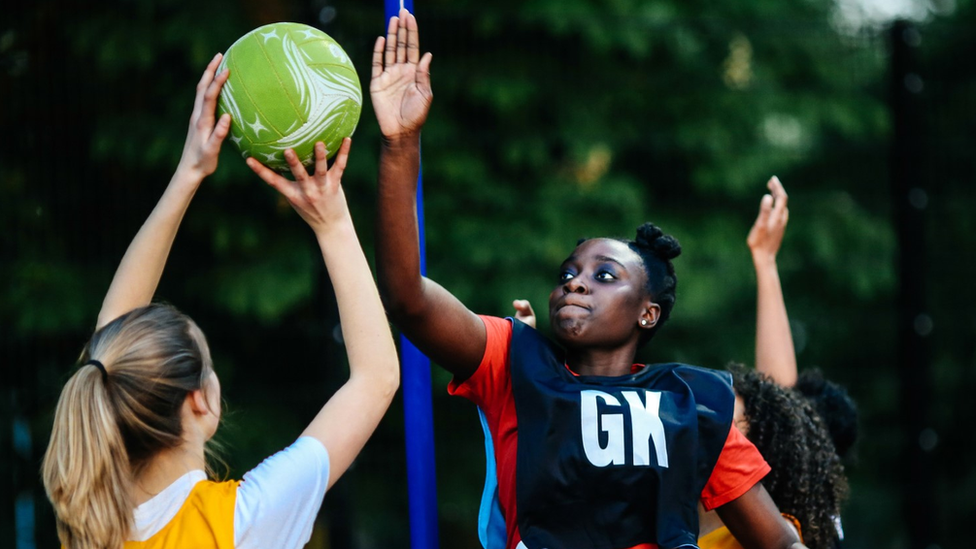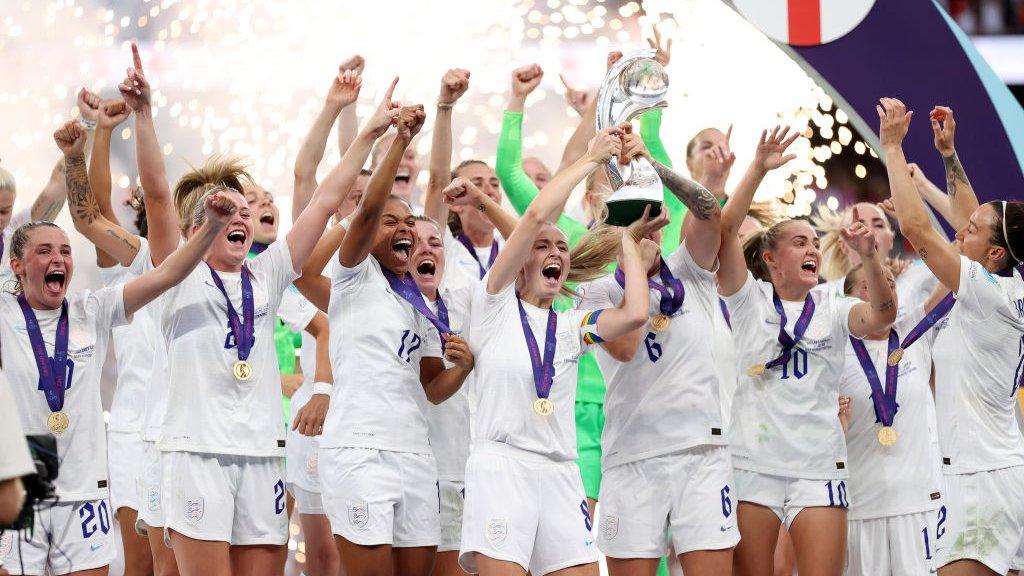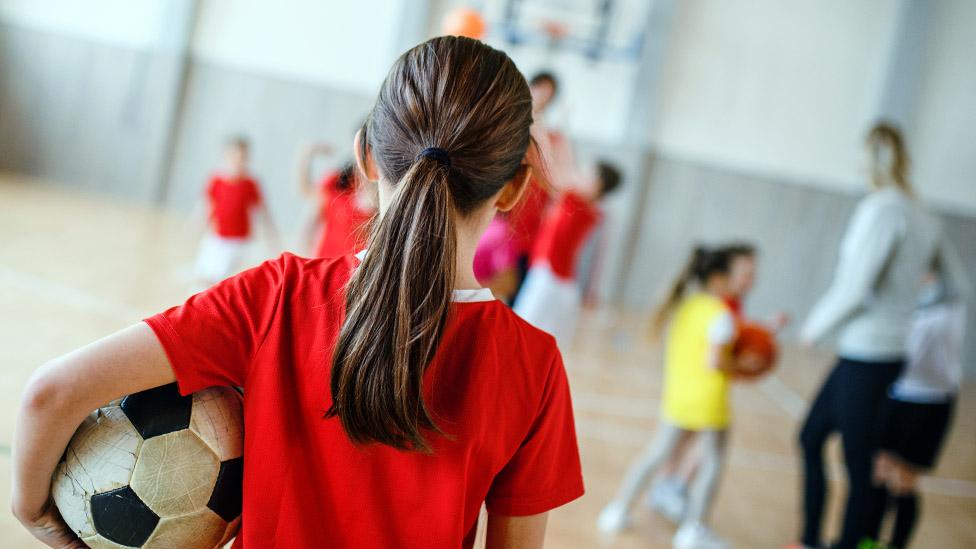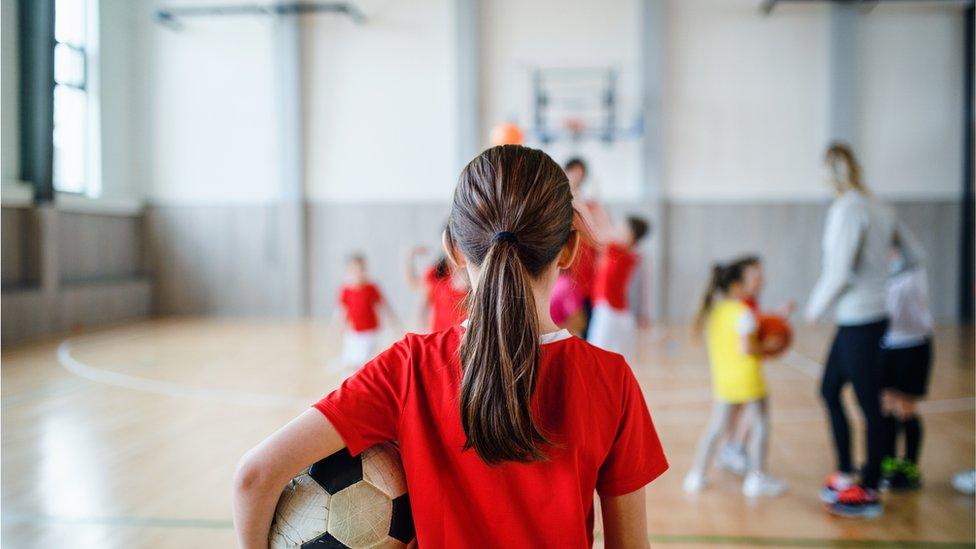Low confidence and periods stop girls liking PE, Youth Sport Trust survey suggests
- Published

Only 59% of girls in secondary schools enjoy PE lessons, compared with 84% of the boys
The gap between the proportion of boys and girls in England who enjoy PE lessons is widening, a survey suggests.
Periods and low confidence were the most common reasons girls who responded to the Youth Sport Trust survey gave for not wanting to take part in PE.
Some 59% of girls in secondary schools said they liked PE or liked it a lot, compared with 84% of the boys.
The girls' proportion in the same survey in 2016 was 74%, whereas for boys it has remained stable.
The government said it wanted to ensure all children had opportunities to create a lifelong passion for sport.
A Department for Education official said its plans for improving girls' access to sport included encouraging schools to offer a minimum of two hours of physical education a week.
'Alarm bells'
More than £600m of funding is to be delivered over two academic years, which was announced after England women's national football team wrote an open letter to the government, calling for more school-sport opportunities for girls.
The charity behind the survey, Youth Sport Trust, said it should "raise alarm bells" about girls' future activity levels as adults and greater action was needed to engage young women in sport.
"There is so much more still to do," chief executive Ali Oliver said.
"At a time of unprecedented low levels of social and emotional wellbeing, we know getting things right for girls in PE can be life-changing."
A-level student Tizzy, 18, who asked for her surname to be withheld, never enjoyed PE. Not naturally sporty, she often felt left out and those who excelled took over.
The curriculum sports such as hockey and netball felt "old fashioned and outdated", she says.
"Some people really like sport and some people don't - and you're forced together and kind of expected to get on with it," Tizzy says.
"I really didn't like it. It was all of it - getting on the bus, getting changed, getting really sweaty, the competitive people shouting at you for not doing the right thing.
"The teachers would pick people who were good at sport to do things - and you were left not really knowing what you were doing."
Body-confidence issues
Olympic pole-vault bronze-medallist Holly Bradshaw said the survey was disappointing but unsurprising.
"I can really empathise with their worries about being watched and judged by others," she said.
"I too have struggled with body-confidence issues, whilst competing for Team GB, particularly after facing online abuse in relation to my body shape."
And if schools offered a wider range of PE kit options, it could help improve girls' uptake and enjoyment of sport.
World Athletics Championships 2023: Holly Bradshaw reaction to not making pole-vault final
Associate dean of the School of Health, Social Work and Sport, at the University of Central Lancashire, Dr Jackie Day-Garner said teenage girls could be encouraged to engage more in sport by role models, such as social-media influencers, female athletes - and by growing up with active mothers.
"Role models for young girls are important," she said. "An active mother, parent, or teacher in the early years can help to influence positive behaviours around physical activity.
"The choice of activities in high school is also important. There has been too much emphasis on organised sport. It might be more appropriate to look at what activities girls are likely to engage with when they leave school."
Nearly 25,000 children were interviewed for the annual survey, with responses from 18,500 girls and 6,000 boys aged between seven and 18 from schools in England.
The 2016-17 figures also included answers from children in Northern Ireland and Wales.
Related topics
- Attribution
- Published8 November 2022

- Published11 October 2021

- Published19 May 2021

- Attribution
- Published14 May 2021
